Between them, these raspberry canes fruit through from June into October.
Grown internationally, they are still something of a British fruit, with so many of the best breeds hailing from Scotland (any variety with Glen in the name) and Kent (ditto Malling).
High in fibre, vitamins C & A, calcium, potassium and folic acid, but low in calories, raspberries are one of the world's most popular berries, and you know how much better they are fresh off the stem at home, rather than shipped in from across the world.
All our soft fruit are certified stock, grown from virus-tested parent material in the UK.
- Uses: One of the great dessert fruits, raspberries are generally eaten fresh and raw, and many varieties make excellent jam and freeze well.
- Good Points: Generally disease and pest free (watch out for raspberry beetle on some varieties), easy to prune and a range of varieties will crop for 5 months of the year.
Most raspberries are summer fruiting - floricane is the proper term - cropping on the canes that were produced the previous year (these are subdivided into Early, Mid and Late Season varieties). They invariably need support to keep the long canes off the ground.
Autumn fruiting varieties, primocanes, crop on the current season's growth, later than floricanes (the earliest primocane varieties start to ripen in late summer, which makes the summer / autumn fruiting distinction a bit vague). They are shorter, bushier, and often need little or no support in sheltered locations.
Will raspberry canes grow in my garden?
Raspberries are easy to grow:
- Light: They do best in full sun, but most will still crop well in light shade.
- Soil: Dry and wet soils are not good, unless improved with masses of well-rotted organic material (which raspberries always love).
- Wind: The stakes used for the straining wires supporting summer fruiting varieties must be strong enough for when the fruit ripens.
Which are the best varieties of Raspberry?
Over the years, British breeders have produced some of the greatest raspberry varieties you can buy. So the choice is wide. Here are a few of the best:
- Early Season: Malling Promise is one of the earliest, and Malling Jewel is a little later.
- Mid Season: Glen Ample has huge crops, great flavour, and is spine-free.
- Late Season: Tulameen is very sweet, while Octavia has large fruit that freeze nicely.
- Autumn: Autumn Bliss and Polka are delicious and don't suffer from raspberry beetle.
When is the best time to plant?
Raspberry canes are best planted barerooted, while dormant, at any time between late-October and March when the ground is neither frozen nor waterlogged. Container grown patio varieties such as Ruby Beauty can be planted at any time they are not carrying fruit.
How to Plant Raspberries
Improve the soil with loads of rotted manure/garden compost. Summer-fruiting (floricane) varieties need permanent support with upright posts 1.8m (6ft) high when in the ground. Strain wires between posts 60cm (2ft) apart. Plant your canes 40-50 cm apart and leave 1.5-2m (4-6ft) between rows.
Autumn-fruiting (primocane) varieties should be planted about 60cm apart in each direction (and usually do not need support).
In all cases, plant canes about 7-8cm (3in) deep, firming them in very gently, then cut all the canes to 25cm to promote more fruiting shoots.
Growing Raspberry Plants
Mulch around your canes in spring using well-rotted manure or compost when the soil has warmed up. Raspberry roots are shallow, so water well in dry weather and don;t trample the soil around your plants. Remove suckers that are too far away from the row (20cm or so). You will probably need to net summer fruiting varieties.
How to Prune Raspberries
Summer-fruiting (floricane). In November, prune out the old canes that carried fruit at ground level. Leave 6-8 of the new season's canes per plant to fruit next year, removing the weakest. Tie these in about 10cm (4in) apart.
Autumn-fruiting (primocane). Cut the whole plant down to the ground somewhere between December and February.
Your mail order raspberry plants are delivered by next working day courier.
If there is anything wrong with your plants when they arrive, Contact Us within 5 working days, and our friendly support team will sort it out.
All bareroot plants are covered by our Refund Guarantee, so you can give them a whirl with complete confidence.




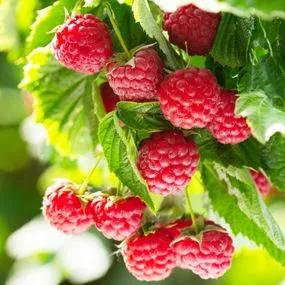
.webp)
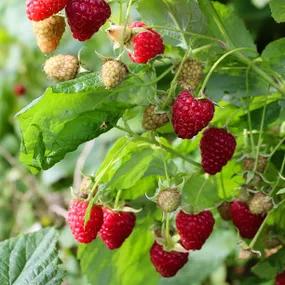
.webp)
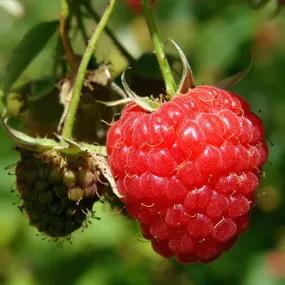
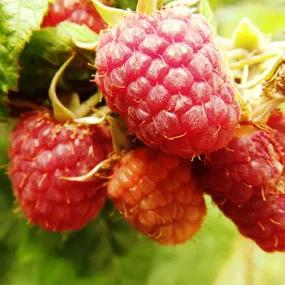
 3.webp)
.webp)
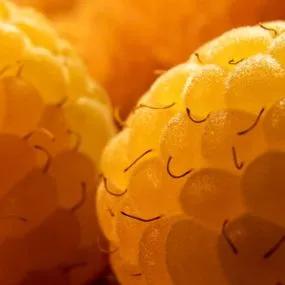
 3.webp)
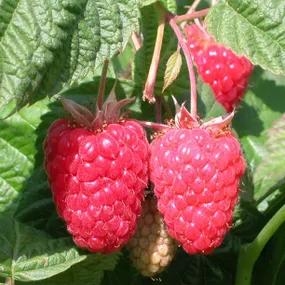


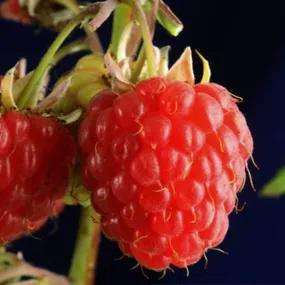
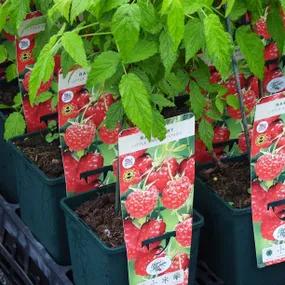
 3.webp)